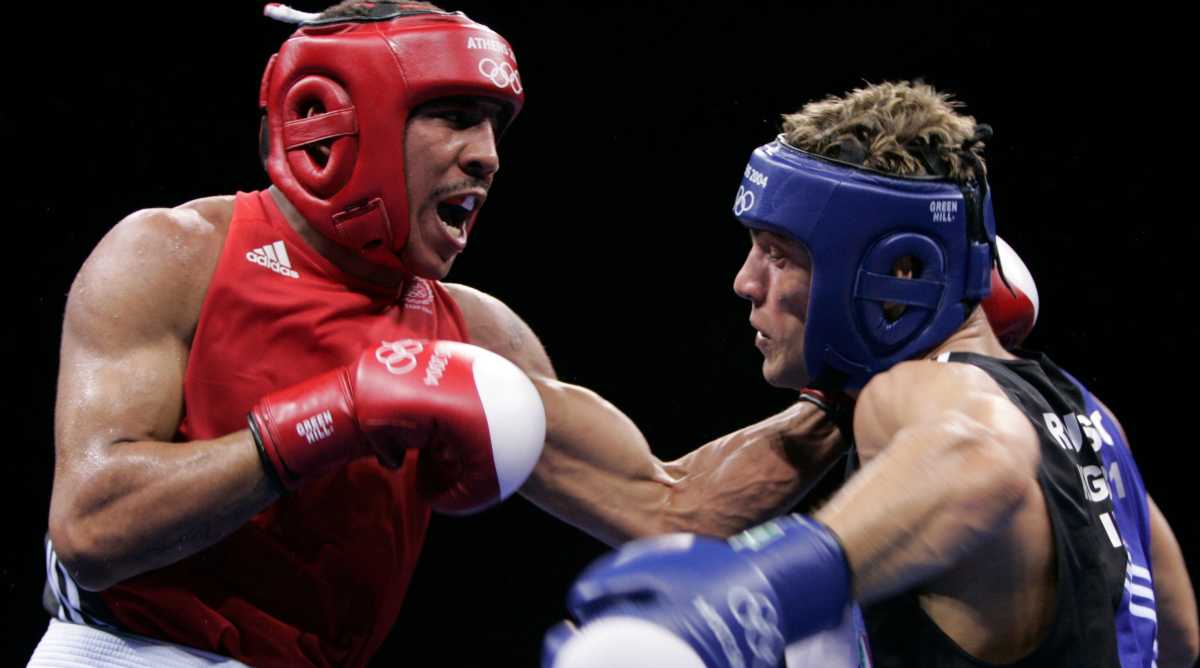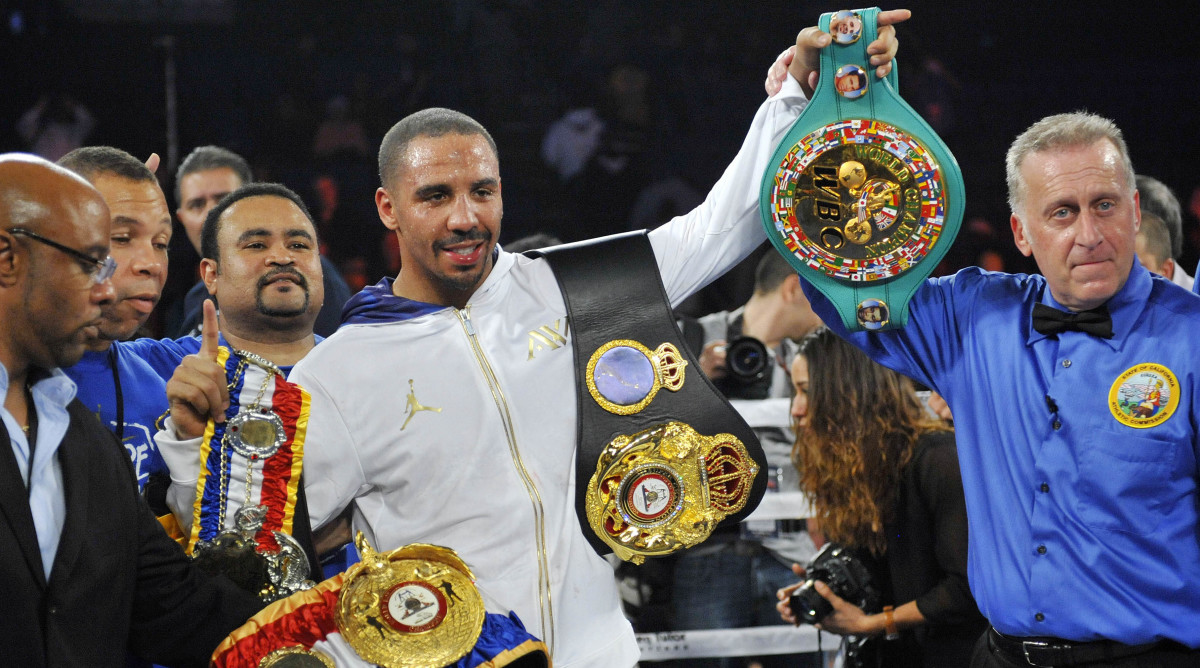Andre Ward Is Finally Ready to Let Us in

Andre Ward’s professional boxing career unfolded unlike any other this century. As the last American man to win an Olympic gold medal (Athens 2004), he boxed professionally from ‘04 until ’17. He won the Super Six tournament that pitted the world’s best super middleweights against each other (’09-’11) in a format that has not since been replicated. He didn’t fight at all for almost two years (Nov. ’13 to June ’15), but the break—to wrest back control of his career—was part of what distinguished him. He retired undefeated, on top but only 33 years old, at an age when most pugilists are still at or near the end of their respective primes.
All that forms a career, again, unlike any other. Ward was different for several reasons. Different for the gold medal, the wait to regain what he desired, his participation in the riskiest tournament staged in boxing in recent memory, his Creed cameo while in self-imposed exile, his last loss (age 12, meaning he’s gone nearly three decades without dropping a bout) and his departure—on his terms, perhaps early, for sure with less damage than if he continued fighting—from the sport. All that, plus something else: Ward never told his story, not in full, not until … now.
Showtime will release the documentary that fills in so many gaps, S.O.G.: The Book of Ward, on June 2. (Full disclosure: I do some side work for the network, but had nothing to do with the film.) My interest stemmed instead from a decade-long fascination with Ward and his career. What did he really endure/survive growing up in Oakland? There were always whispers. Why did he fight all the best challengers in his divisions? Nobody does that anymore. Did he agree with my contention that, of all the contenders for best boxer of the most recent eras, he held a better claim than Floyd Mayweather Jr.? I’d put Ward’s career résumé ahead of Mayweather but below Manny Pacquaio and not by much.
To that end, I hopped on a Zoom call with Ward in early May. He sat on a leather couch, framed exactly as in the documentary, and was similarly open, answering all questions about the film, his reticence to tell his story in full and everything else. An edited and condensed version of that conversation is laid out below.

Sports Illustrated: You always fascinated me, in part because you never told your story, and people in boxing always said there was so much more to it. Did you always know you would? Or did you come to that realization more organically?
Andre Ward: Both. Initially, I’m young, man, I’m just trying to get my life together, and I wasn’t thinking about telling a story. I was trying to stay out of the streets and just survive. And then as I started getting a little older, started understanding the storytelling piece and how things worked, I knew that I would tell it one day. And I say this a lot: I’m an 80s baby, and the way I was raised is that we don't share our personal business; it’s family business. It’s more about a respect thing and a privacy thing. And then my father passed. Over time, I started feeling more of a burden to share, for my sake, because it’s therapeutic.
SI: The tone of the piece stood out. It reminded me of your boxing career, in that you didn’t duck tough subjects. Your lens there was unsparing. But you also addressed those topics—the flaws and beauty in your hometown of Oakland, addiction in your family, teenage pregnancy—with empathy and nuance. Was that intentional?
AW: That was the goal. I wasn’t just thinking creatively and visually. I was thinking about the individuals, their legacies and how they would be portrayed, because once this is complete and finished, it’s out there forever. The key thread was just redemption. Because my parents' story, my story, it was all redemptive. My dad didn’t die an addict. My mother isn’t an addict right now; she’s in my life. That’s not our story. Things got better, and it was important to have that arc.
SI: Why are there so few truly untold stories like this in sports?
AW: I probably could have sold a few more tickets and more pay-per-views if I would have just led with all of this stuff. There probably would have been some more empathy toward me and my career. Just what I’ve overcome. But I exchanged that for this moment. I just cared about my family’s legacy too much.
SI: For me, one thing that ties your career to the documentary is the intentionality involved. That’s partnering with SpringHill, the company started by LeBron James and Maverick Carter, to make the film and retain a say in creative control. That’s the interviews lined up for this with folks like Marshawn Lynch. That’s telling your story, your way. Agree?
AW: I’m hands on with anything I do. It was very intentional from where the music was chosen and cleared to where that music was placed. I wanted Oakland, the scene in the 80s and early 2000s, to live and be accurate. The conflicts that I had with [music mogul] James Prince, I wanted to make sure I didn’t go too far but told the story the way that it was. The [promotional beefs] were sensitive. I just wanted it honest, vulnerable and as truthful as I possibly could be. That’s kind of my game. Precision. To your point.
SI: Could you identify with LeBron at all? For instance, in the documentary, you admit to reading negative press about yourself. He has certainly had his share. You both seized control of your careers as much as someone can in your chosen sports. You both surmounted injuries. You both refuse to be placed into boxes normally used for athletes of your statures.
AW: With the whole shut-up-and-dribble thing, everything that LeBron and Maverick push, we’re supposed to be a certain kind of way. More specifically with fighters, I’m not a rebel, a guy that just pushes against the status quo just for the sake of it. But if I see something that’s wrong, or if the math isn’t math-ing, or I start doing a deep dive historically, and I see that it’s always like this, this pattern, and nobody wants it to change, I might be one of the guys that grabs the mic and says, something needs to change. You’re gonna get backlash. But that’s O.K. What I learned throughout my career is that’s oftentimes a sign you’re right where you need to be.
SI: To me, what’s weird is that what you did is considered so unusual. Why is that?
AW: I agree. But it’s rare. I’ve said this, even about African-American fighters, us more so than anybody else, we have to act a certain way. We have to show you our cars, our jewelry, or we’re considered boring. And it’s like, if you’re really listening, though, there’s a lot of African-American fighters saying a lot of great things, who have great stories. Look at Danny Jacobs. Danny got knockouts. Danny overcame cancer. But didn’t have that mainstream push like he should have. I could go down the list throughout the years of the nit-picking that would happen, the labels that were put on fighters, namely Black fighters, because they didn’t give the media what they were used to seeing.
I was talking about legacy. Maybe if they caught me in 2001, 2002, I would have given them that guy. Because I was that guy, at one point in time. But you grow and mature. I started to understand my dad’s legacy, what he left and my family name. I didn’t want to be a guy just to sell pay-per-views and act a certain kind of way, just to give you some cheap entertainment. And then look at my son and daughter and say, don’t act like that. I care more about my family name. Whatever may come of that, so be it.

SI: The parts on your dad were touching. What do you think he’d make of the film?
AW: He would enjoy it, appreciate it, approve.
SI: You say something near the end of the documentary that stuck me. How could you want something for me that I don’t want for myself? To me, that speaks to why your career, for all the accolades, the gold and everything else, is still criminally underrated. I’d posit that you have a better, more complete, less risk-averse résumé than Mayweather. Do you agree?
AW: I’m not going to argue with you. (Laughs.)
SI: You held onto so much of this for so long. What’s it like now, only weeks away, from your full, untold story being put out to the wider world?
AW: It feels a bit crazy. I’m going to be honest. Even going through this whole process, it’s like, man, do I really want to share all of this? It got to a point where it would become selfish to not share. You can’t overcome a lot and then keep it to yourself. You gotta share it. That’s part of what I’ve been put on this earth to do—to inspire, through my struggles and my triumphs.
(Pauses and resumes.) Sometimes, I laugh at all this. It’s wild. I’m 39. I’m not even 40 yet.
